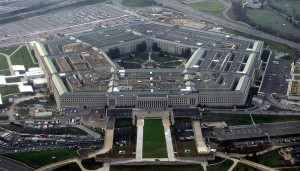Chief executives from Lockheed Martin Corporation have predicted they may have to fire 10,000 workers if sequestration budget cuts are forced on Congress, but prophecies of economic doom if defense spending is cut aren’t up to snuff.
 Former Vice President Dick Cheney, shilling for the military industry as usual, spoke at a private meeting with Senate Republicans on Tuesday and predicted possible cuts totaling $500 billion over 10 years could be “devastating” to military modernization and planning. Even if that were true, which it isn’t, he failed to explain why that would be a bad thing.
Former Vice President Dick Cheney, shilling for the military industry as usual, spoke at a private meeting with Senate Republicans on Tuesday and predicted possible cuts totaling $500 billion over 10 years could be “devastating” to military modernization and planning. Even if that were true, which it isn’t, he failed to explain why that would be a bad thing.
The military-industrial-congressional complex has been very active in recent weeks, lobbying hard to maintain current spending levels and projections. They fear-monger about devastating cuts, but all that’s even being considered are minor decreases in the rate of growth of defense spending. No actual “cuts” are even on the table.
One recent study, “commissioned by a top defense and aerospace trade association” – namely, the Aerospace Industries Association and the International Association of Machinists and Aerospace Workers – found that “a new batch of planned Pentagon spending cut would cause 1 million jobs to be lost next year.”
The National Association of Manufacturers, another lobby group, repeated this finding, adding that proposed cuts would “increase unemployment by 0.7 percent, and decrease gross domestic product by almost 1 percent.”
But, as Lawrence Korb, Senior Fellow at the Center for American Progress has just written, these lobby groups kind of fibbed up their numbers.
“To maximize their findings (and their political impact),” Korb writes, “both studies assessed the effects of defense sequestration on every sector of the economy that could be hit by “’nduced effects,’ including secondary and tertiary effects like reduced consumer spending. As a result, the ‘1 million jobs’ figure includes jobs in industries as distant from defense as ‘retail trade’ and ‘leisure and hospitality services.'”
And besides, Korb points out, “defense spending is not a jobs program.” At least, it’s not supposed to be. As far as the health of the economy is concerned, defense budgets are a net drain. The jobs that these rent-seeking defense corporations maintain only show what big business can do with taxed and diverted wealth.
The proposed cuts to defense budgets are, frankly, puny. Overall defense industry profits have skyrocketed since 9/11 and the harshest scenario for defense cuts would only put budgets back at about the 2007 level.
The true crisis is the debt-ridden government. The US budget deficit grew by nearly $60 billion in June, and is on track to exceed $1 trillion for the fourth straight year.
More than a quarter of what Washington spends money on every year is spent on the warfare state. That’s about 65% of all discretionary spending.
“The United States spent $728 billion on its military in 2010,” according to the Mercatus Center, “about 45% of the world’s $1.6 trillion total. US spending amounts to more than the next fourteen largest military spending countries combined. In fact, the US spends nearly 6 times more than the next largest military spender, China.”
More inclusive estimates on national security spending find that the true dollar amount the US spends every fiscal year exceeds $1 trillion.


